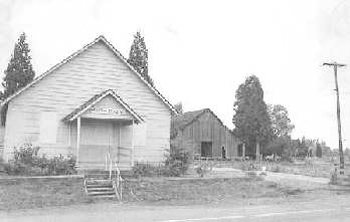It was founded in the mid-19th century by pioneers (many of Irish extraction) who hewed the forest to clear land for farming.
It originally was called St. John’s, after St. John’s Mission, a church built in 1868.
Today it’s called the Barberton area, a district of rolling land dotted with small farms, residences and a sprinkling of small businesses.
The boundaries of Barberton are open to interpretation, but old maps indicate the pioneer community lay roughly between Northeast 78th Street on the south, Northeast 119th Street on the north, Northeast 50th Avenue on the west and Northeast 87th Avenue on the east.
According to historical accounts, Barberton was named after its first postmaster, a man named Barber. It is not clear whether his first name was Milo, Edwin or Leon, since different sources list different first names.
The Barberton post office was located just south of the present Barberton Grange Hall. The post office was closed in 1903 when rural free delivery was extended from Vancouver.
The earliest pioneers are believed to be Mr. and Mrs. Thomas Thornton, who arrived about 1848. The Thorntons donated land for St. John’s School, which opened in June 1872 and which later became the Barberton school.
St. John’s Road, which offers access to the area from the Rosemere district of Vancouver, was the pioneer route to the Barberton area.
The Barberton School District was merged with the Battle Ground district in 1955 and the school was closed.
A Barberton station sign where the Longview, Portland and Northern railroad track crosses Northeast 72nd Avenue is about the only reminder left of the community that ranks among the earliest in Clark County.
Joseph LaLonde, 19916 N.E. 50th Ave., is a longtime resident, who remembers many of the pioneer families – the Thorntons, Curtins, Donovans, Healys and McCarthys.
“Not many of those old families are around here any more,” LaLonde said.
He said there have been a few housing developments in the Barberton area, but not nearly the development seen elsewhere in Clark County.
But there are changes, he added. “At one time it was all farms,” he said. “Now no one out here makes a living at farming any more.”
Update: April 2002 From Clarence LaLonde, who wrote to tell me the name of the postmaster was Milo Barber and the Post Office was North of the Grange hall by the railroad tracks. His father Clarence, 1885 and his uncle, Joe LaLonde, 1892, were born in Stanford Nebraska. The family came to Vancouver in 1904 and farmed in the area of LaLonde Drive extension of NE 99th.
